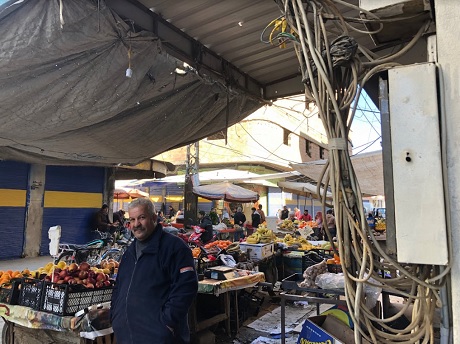Qamishli residents would welcome Damascus deal – if it brings security

QAMISHLI, Syria – Faris Kemal points to the jagged gashes in the tin awning over his market stall, laden with colorful fruit. They’re bullet holes left over from clashes between the Syrian army and Kurdish forces, he explained.
These two sides have largely avoided conflict over the last eight years, but the scars that mark Kemal’s shop are clear evidence of the tensions which occasionally erupt into clashes.
Kemal, 46, has been selling fruit in this bustling market in central Qamishli for 33 years. In December 2011, a frontline in the Syrian conflict was established about 200 metres from his stall. The regime put up barriers around a pocket of security and administration buildings in the northern Syrian city that is governed by the self-autonomous Kurdish administration.
Gunfire has broken out near his shop several times over the years, said Kemal.
One skirmish was sparked when regime forces tried to conscript young men from the Kurdish-controlled side into the Syrian Arab Army. Kurdish authorities demanded the young men’s release. The regime refused and a fight ensued.
Another time, the regime attempted to expand its territory, one street at a time, but was rebuffed by the Asayesh (Kurdish security).
The Kurdish administration – threatened with Turkish attack as the United States prepares to pull its troops out – may now have to strike a deal with its sometime-adversary.
“We will be obliged to agree a deal with the regime so that it deploys its troops along the border and protects us,” Aldar Khalil, head of foreign relations for the governing TEV-DEM coalition in northern Syria, told AFP in a recent interview.
They would have clear conditions that include maintaining autonomy and having their own forces manning the borders, he added.
A youth stands outside a store in downtown Qamishli, northeast Syria, on February 19, 2019. A flag of the Kurdish People's Protection Units (YPG) hangs over the shop window. Photo: Hannah Lynch / Rudaw
In the Qamishli market, people are ready for a deal and to see their city returned to normal.
The city blocks held by the regime are clearly marked with Syrian flags and large, sun-bleached posters of President Bashar al-Assad. Sandbags and blast walls line the fortified entrances. Other streets are completely blocked off.
Cars and motorbikes are not able to enter the regime-held streets. Pedestrians crossing the barricades are searched.
Blast barriers, sandbags, and sun-bleached posters of Syrian President Bashar al-Assad populate regime-held areas of Qamishli, February 19, 2019. Photo: Hannah Lynch / Rudaw
“I want to see the barriers come down,” said Kemal, who is ready for the war to end. “We hope one day this will be done.”
He does not, however, want to see Assad regain control. Assad’s government, and that of his father Hafez before him, has discriminated against the Kurdish population for decades, depriving them of fundamental rights including citizenship.
“The regime never does anything good for us and we don’t accept them,” said Kemal.
Faris Kemal stands beside his fruit stall in Qamishli, northeast Syria, on February 19, 2019. The tin roof overhead is dappled with bullet holes caused by recent skirmishes between Syrian regime forces and Kurdish Asayish. Photo: Hannah Lynch / Rudaw
Another nearby vendor disagrees, arguing that security was much better under Syrian regime control, before the country descended into conflict and into the grip of rival armed groups.
It was safer when the regime controlled everything, said Mohammed, who did not want to give his full name. He is hopeful security will be restored in northern Syria with the return of rule from Damascus.
He does not want a return to business as usual, however.
Before the war when the area was under regime control “we didn’t have money,” Mohammed said, noting the widespread poverty afflicting Kurdish areas. It is a problem that has not been fully addressed the self-autonomous administration, which charges hefty fees for space in the market, he added.
Market stall holders complain of high taxes under the TEV-DEM government, but most of all want peace and security, February 19, 2019. Photo: Hannah Lynch / Rudaw
Whether power lies in Damascus or with the Kurds, what Mohammed wants most of all is “a government that will work for the people.”
And it’s not just Qamishli’s Kurds who feel this way. Abu Omar, an Arab friend of Mohammed, agrees.
“We have experienced many governments,” said Omar. “But no one cares about us.”

